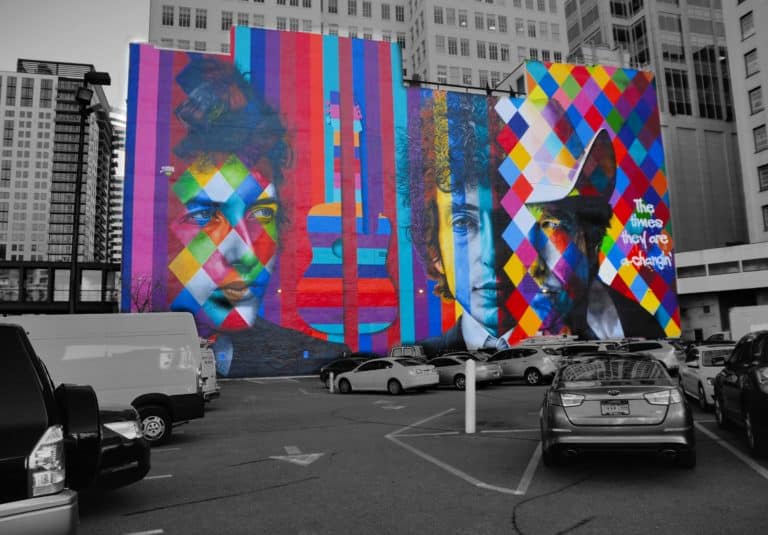
Image by Jonathan Pellgen/Flickr, Some Rights Reserved.
Surrendering Authorship of Your Own Story
“We are coming to believe that our minds are entirely sufficient to understand the universe in its entirety. This means a shrinking respect for mystery—religion vanishing as a meaningful part of our lives (or being used, in its fundamentalist forms, to beat back mystery, rather than engage it); an increasing acceptance that if something is ‘effective’ (profitable, stockholder-enhancing), then that answers all questions of its morality. This insistence on the literal and provable and data-based and pragmatic leaves us, I think, only partly human.” —George Saunders
As a writer, one of my professional tics is to shape what I experience and what I observe into narrative. I almost addictively look for patterns, draw lines between dots, rejoice at the discovery (let’s be real, sometimes imposition) of beginning, middle, and end.
I know this isn’t unique to writers, of course. We all hunger to make sense of the nonsensical, to bend the seeming randomness of our lives to the will of our comfort in story. If we can explain it, then the world feels less haphazard; if the world feels less haphazard, we feel less at sea.
It’s easy to spot this in the person who talks about a tragic thing that happened to them and then quickly fast forwards to the silver lining: I lost my mother, which was devastating, but it convinced me that life is short and inspired me to finally quit the job I hated, as a result, or, Our divorce has led me to a deeper understanding of who I am, and in the end, I think the kids are better for it.
It’s not that these silver lining testimonials are untrue. They are as true as they are real for the teller. They are crafting a narrative that makes the horrible, painful thing virtuous, worthwhile, meaningful. What I find fascinating is our impulse to bully our experiences, especially tragic, into narrative. It’s like we cannot abide by the tragedy until it’s transmogrified into a delayed triumph.
The novelist George Saunders reminded me of this recently while reading his conversation with Jennifer Egan in a recent issue of The New York Times Sunday Magazine dedicated to the future. We have a “shrinking respect for mystery” it seems to me, not just in regards to the big wide world and all its unknowns, but also in regards to our own little lives. Is there always a silver lining to tragedy? Do we really have any clue as to why we end up with this parent, this partner, this child? Why do we feel the compulsion to be so sure about so much?
At the twilight of my 20s, I had a rug-pulled-out-from-under-me moment. Big time. I was sort of trudging along, in a healthy, if not thriving, relationship with an unconditionally loving, whiskey-drinking bear of a man, living in my own apartment in Brooklyn, surrounded by an awesome crew of friends, feeling like I was finally on my feet, professionally. Without being conscious of it, I’d written my story way into the future. I wasn’t going to get married. I was going to live in Brooklyn, likely forever. I was… I was… I was…
And then I went on a writing residency 4,000 miles from my apartment in Brooklyn and my tidy, albeit largely unconscious, narrative — and learned that I actually wasn’t the author of my own story. Someone else was typing away, pages beyond what I knew to be true. My wake up came in the form of an architect/writer, serendipitously positioned in the studio next to mine, a love I neither knew I wanted nor could escape. It just was.
Truth be told, it wasn’t Eat, Pray, Love. I spent much of that residency lying on the floor, staving off anxiety attacks.
I liked my tidy narrative. I was deeply, even physiologically invested in it. I loved my unconditionally-loving, whiskey-drinking bear of a man. I didn’t want to hurt him. I didn’t want to fracture the life we’d shaped over a decade of closing down bars and lying in the park with dear friends. I didn’t want to consider that someone might demand something of me that contradicted the story that I’d told — both personally and publicly — about who I was going to be. Never a wife, for starters.
But the mystery, in the end, was stronger than the suffering I felt as I surrendered my authorship. As the anxiety started to pass, there was actually a deliciousness to the humility: Oh, shit, I guess I have no idea what my life is supposed to be like. How lovely. How lightening. I guess I should try to be as ethical as possible within the context of all of these unknowns and enjoy the ride.
As I was reflecting recently on the transition into motherhood, I realized that there are three distinct years that my life transformed most profoundly: at 18, when I went off to college, leaving the familiarity of Colorado Springs for the gritty enigma of New York City; at 29, when I surrendered to the love in the studio next door; at 34, when I became a mother. All of them were moments when I was humbled by my lack of knowing. All of them demanded patience and endurance and the supreme challenge of being gentle with myself.
Most importantly, all of them left me awed by the mysteries that remain. There’s so much we don’t know about who we are and who we will become. Isn’t that frightening? And isn’t it thrilling?

